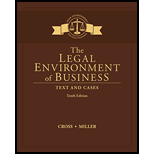
Case summary: The person RB had applied to the University of Kansas School of Law, wherein during the admission process he knowingly provided false information regarding his criminal history. In the past, he had been convicted of domestic battery and driving under influence. He was accepted in the University but his criminal background was found out. Later, he was notified of the intention of dismissal and granted an opportunity to explain himself in writing, but he asked for a hearing. The hearing was denied and he was dismissed from the University.
To explain : The action of the school to dismiss the person RB denying him due process.
Trending nowThis is a popular solution!

Chapter 4 Solutions
The Legal Environment of Business: Text and Cases (MindTap Course List)
- Compare and contrast the three core means of adding shareholder wealth; Cash Dividends, Stock Dividends and Stock Splits, and Stock Repurchases. Include the various advantages and disadvantages of each one.arrow_forwardHow to calculate the future value?arrow_forwardhow to caculate the future value?arrow_forward
- Use literature to say why semi- structured interviews and a focus group to state why these are good methods of qualitative studyarrow_forwardYou are employed by an external audit firm that is hired by JBltd, a privately owned incorporated business. Accounting records are maintained on a computer using proprietary software. You have worked on the audit for three years and this year you are in charge of the audit. Your assistant is a newly recruited business graduate who has done an accounting course but has no practical experience. Because of the small size of the company there is limited opportunity for segregation of duties. You decide, as in previous years, that the appropriate audit strategy is to obtain evidence primarily through the performance of substantive procedures. You also plan to perform the audit around the computer as the proprietary software is known to be reliable and details of all transactions and balances can be readily printed out. On arriving at the company's premises in December 2019 to perform the final audit on the 31 October 2019 financial statements, you obtain a copy of the year end bank…arrow_forwardGeneral accountingarrow_forward
- what is an annuity ?arrow_forwardThe principles of good lending that are normally followed in many lending decisions are What are the possible principles listed below that an organization can use a.the margin of profit , b. the purpose of the loan c. security that is not required in case of non payment by the borrower , d. the character of the borrowerarrow_forwardCalculate the future value of a lump sum of $1,000 invested for 4 years at 10%, using compounded quarterly.arrow_forward
 BUSN 11 Introduction to Business Student EditionBusinessISBN:9781337407137Author:KellyPublisher:Cengage Learning
BUSN 11 Introduction to Business Student EditionBusinessISBN:9781337407137Author:KellyPublisher:Cengage Learning Essentials of Business Communication (MindTap Cou...BusinessISBN:9781337386494Author:Mary Ellen Guffey, Dana LoewyPublisher:Cengage Learning
Essentials of Business Communication (MindTap Cou...BusinessISBN:9781337386494Author:Mary Ellen Guffey, Dana LoewyPublisher:Cengage Learning Accounting Information Systems (14th Edition)BusinessISBN:9780134474021Author:Marshall B. Romney, Paul J. SteinbartPublisher:PEARSON
Accounting Information Systems (14th Edition)BusinessISBN:9780134474021Author:Marshall B. Romney, Paul J. SteinbartPublisher:PEARSON
 International Business: Competing in the Global M...BusinessISBN:9781259929441Author:Charles W. L. Hill Dr, G. Tomas M. HultPublisher:McGraw-Hill Education
International Business: Competing in the Global M...BusinessISBN:9781259929441Author:Charles W. L. Hill Dr, G. Tomas M. HultPublisher:McGraw-Hill Education





